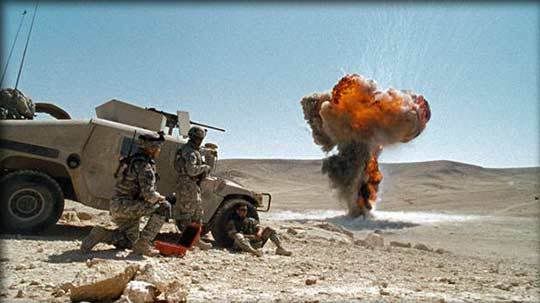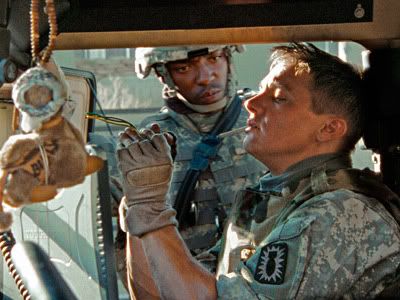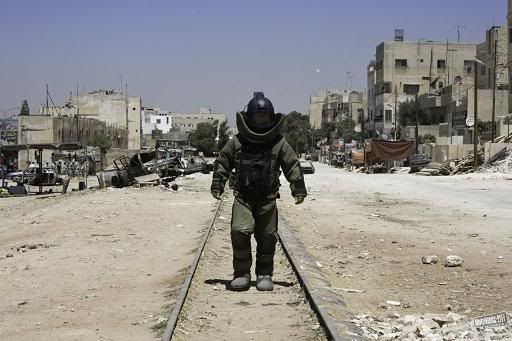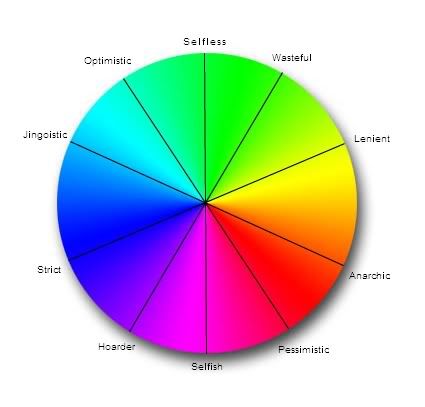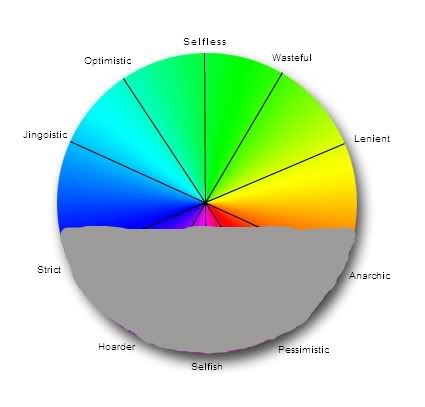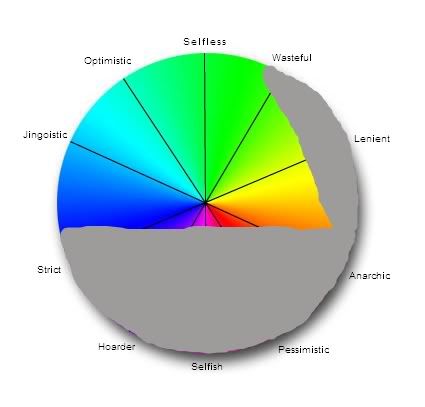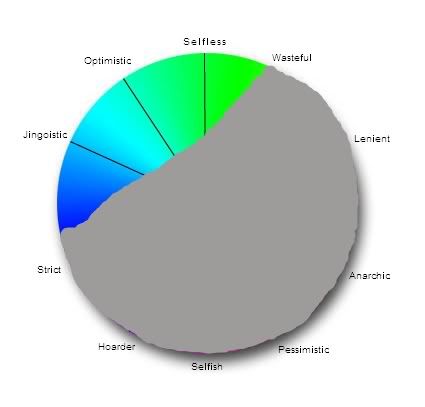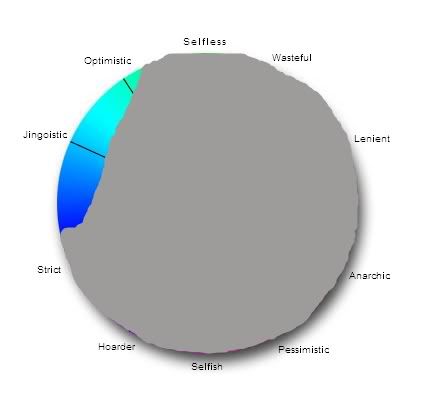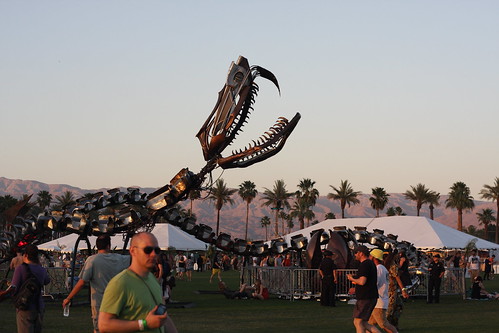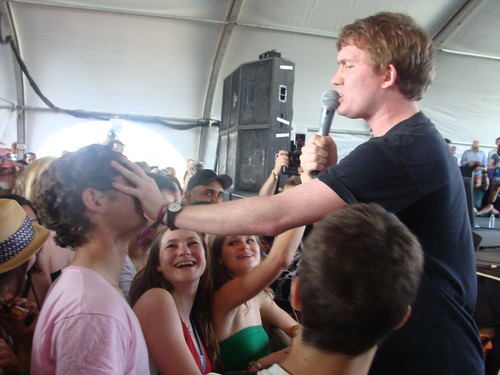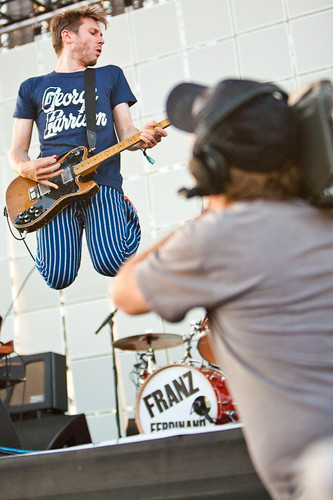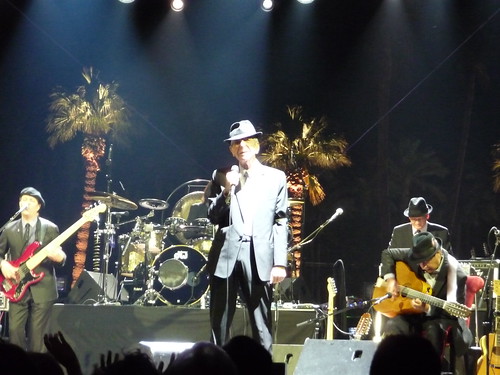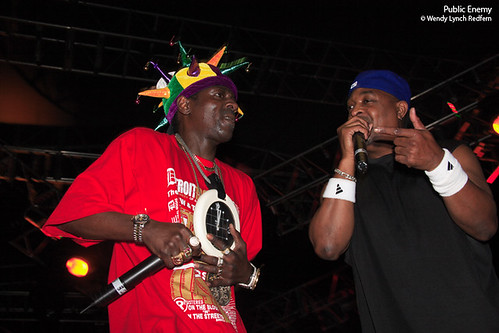I'm also adding short annotations for each song, for the first time. It's kind of a writing exercise for me and I may stick with it or not in the future, so let me know if you like it or think it's horrible.
Music overload after the jump...
"A Few Pebbles Short of an Avalanche" - Fall 2009
1. The Walkmen - Brandy Alexander
"Stop talking and listen to me. I'll tell you of every dream."
I've been listening to a lot of You & Me lately, but for some reason this short slow-burn hidden near the end of A Hundred Miles Off spoke loudest to me this season. Part of that's admittedly because I wanted to try a framing concept with this playlist, to do with dreaming and living and how we try to connect the two. Hamilton Leithauser's no stranger to waxing poetic on exactly this kind of thing, so who better to start with?
2. Yeasayer - Ambling Alp
I like the slow, otherworldly build at the beginning of this song - it's a nice segue from the setup at the end of the last one. It builds into one of Yeasayer's most straightforward pop songs yet, and whether you think that's good or bad is up to you. These guys have kind of unjustly been derided as trying to ape Animal Collective's bid for more centrist freak-rock in 2009, but I don't get that. Isn't there enough room for everyone in this sub-sub-genre right now? Space may be dwindling, but it's clear these guys are having fun while they can.
3. Mew - Beach
Arriving late because you stopped to smell the roses - it's something we can all relate to. Distractions are everywhere, and what at first feels like the most important thing in the world can evaporate like any ephemera. And "Beach" is, appropriately, a sunny, poppy clearing amidst the post-prog hills and valleys of No More Stories..., though no less engaging for it.
4. The Dodos - The Strums
"So children, kill your teachers, kill your parents, then kill your preachers"
There's something kind of amazing about such a blunt statement coming from dudes known for their unironic and typically romantic songs. There probably wasn't a better anti-authoritarian screed anywhere else this year, if only because it came from such an unexpected and understated quarter.
5. Ra Ra Riot - Can You Tell
It's pretty on-the-nose, but I like it. RRR does some really tight, catchy pop-rock that doesn't reinvent the wheel, but still has a welcome place in my library.
6. Bon Iver - Brackett, WI
Its parts aren't much - all haunted vocals and collapsing chord progressions - but like any great Bon Iver song, they add up to much more than you'd expect. Yet another reason I regret being so late to the party for the Dark Was the Night Red Hot compilation.
7. Animal Collective - Taste
"Am I really all the things that are outside of me?"
Continuing themes from another song you might have heard, this song is actually almost its opposite: downtempo instead of dancy, fearful and reactionary instead of triumphant and forward-thinking. Wouldn't make a great single, but it resonates. You look back and, with a realization of horror, you may think: "Is this how I'm going to live my life?" Well, is it?
8. Phoenix - Sometimes in the Fall
I saw Phoenix play the Greek Theater a few months ago. I generally hate big concert venues in L.A., since most of the seats end up getting taken by industry types or celebrities or bored rich motherfuckers or whoever - basically a whole crowd of people who are only there to hear the band play their hit single, if that. Behind me at this show were a group of kids that couldn't help but fill the void between songs by screamsinging "Sometimes in the fall, fall fall FALL!" whenever they could. It wore on me a little, and Phoenix never did play it, but damn if I wasn't right there with them, a few actual fans in the crisp chill of a fall L.A. crowd.
9. The Flaming Lips - Watching the Planets
It's just such a crazy, layered song that that you're constantly finding new things to like about it - the camouflaged bassline, Karen O's shrieks, the pound of drums so heavy you feel they might explode any second. A lot of Embryonic is purposefully obtuse and abstract, but this is the album's perfect entry point - placed, of course, right at the end.
10. Built to Spill - Car
A Spin Magazine article once described a lot of Doug Martsch's songs as (more or less) "epics that sound like throwaways, and throwaways that sound like epics". I always thought the first bit sounded like a back-handed compliment, but the second is right on the nose with this sub-3 minute track from 1994's There's Nothing Wrong with Love. At first understated, it blossoms into a play-to-the-rafters exploration of love, dreams, blissful ignorance and the true nature of all things. And then, not even three minutes in, it's over. Throwaway? Not in the least. Epic? Absolutely.
11. Bear in Heaven - Lovesick Teenagers
"Lovesick teenagers don't ever die. They will live forever."
A spiraling meditation on growing older, wiser, and realizing you haven't changed as much as you thought. Oddly as dark as it it optimistic, it's an appropriate illustration of reaching out and flying as high as you can - before you crash into the ground.
12. Passion Pit - Folds in Your Hands
Don't let sub-par Youtube videos and Talk Show appearances fool you - Passion Pit is a hell of a live band. Playing some songs straight and remolding others ("Seaweed Song" somehow becomes more evocative and unique as a solo piano ballad), the band nailed pretty much everything when I saw them a few months ago. Of particular note was this song - maybe because I wasn't that familiar with it, I was floored when the 1:22 breakdown kicked in, they knocked it the fuck out of the park and I found myself caught up in the joyous current of pogoing hipsters. I hadn't known it well before, but now there's no way I'll forget it now.
13. Yacht - It's Boring/You Can Live Anywhere You Want
The obvious reason being that my home life is about to be upended as I move to a new apartment, but that's not to belittle this song on its own merits. See Mystery Lights is a hell of a sophomore evolution for a band that used to be a one-man (and fairly one-trick) outfit; their jump to the DFA label isn't surprising, since suddenly they seem to be one of the only groups trying to push the boundaries laid down by label pioneers LCD Soundsystem and The Rapture. You can track the sound's evolution as a microcosm in this track alone, but chances are by the 7-minute mark you'll just want to give in and dance.
14. Islands - Heartbeat
OK, no doubt auto-tune is the Great Satan of 2009, but every now and then it's actually used appropriately - see most of Kanye West's Heartbreak and 808s and, well, this song. The weirdly faux-emotional pitch shifts are a surprisingly good fit for a cheery song about jilting an ex-lover. Not that I want an auto-tune indie trend in 2010 (I really don't), just a nice surprise here and there.
15. Grizzly Bear - While You Wait for the Others
Continuing a theme: there comes a time when even the nice guys of Grizzly Bear have to say "enough is enough". Maybe you tried really hard (or maybe you didn't), but if things don't work out, there will come a time when you're asked, kindly, to make your way. Veckatimest is lyrically a fairly inscrutable album, but this song, tucked away near the end, has enough emotional resonance to make up for the rest of the album all on its own.
16. Health - We are Water
A mercurial murk of hollow vocals and searing guitars, the soundscape of this song is everything its title suggests. How can we, as people, even try to stay in one place, to do one thing, to feel one way? We put up our walls and make our decisions and follow our plans. But underneath it all, we're as temporal as any of the weather. We're slaves to our emotions and our fears and a thousand things beyond our control. We are capricious and petty. We are opportunists and survivors. We are elemental. We are water.
17. Franz Ferdinand - Lucid Dreams
I've spent way too long arguing with my friends over which version of this song is the best. I seem to be in the minority thinking it's the album version (the one included here). Where the single version takes a while to get going, this cut almost blasts out of the gate from the beginning, and doesn't let up until the electronic morass at the end (which, admittedly, I could do without). The tribal drums, too, really set this apart from the band's other work in a way that the single version can't claim. The more I think about it, the more I feel like we're supposed to like both versions together, as if the single cut is there to lay down the groundwork, and the album version is meant as a very specific call-back that still pushes everything forward. Still, if I have to choose one, it's this. So there.
18. Oh No Oh My - I Painted Your House
"Perhaps it's time we grow..."
Somehow, this is one of the saddest songs I've ever heard, a cheerily bittersweet song about genuinely trying hard - and failing. It still gets me most every time. But while it'd be easy to wallow in defeat, the important thing is that this song doesn't. Still, after everything, you've got things to build, places to go. If your painting didn't do the trick? It's OK. You can always come back later with your guitar.

